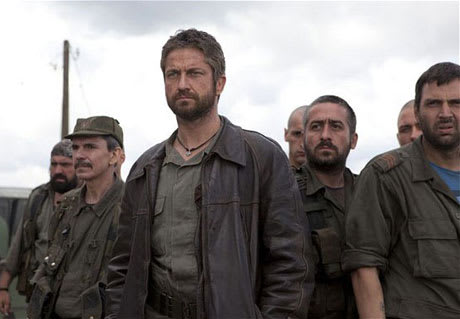Coriolanus marks Ralph Fiennes' directorial debut. Set in a modern day Roman city-state, the film remains true to Shakespearian language while also delivering gritty and relentless performances from its main characters: Caius Martius Coriolanus (Ralph Fiennes), Tallus Aufidius (Gerard Butler) and Volumnia (Vanessa Redgrave).
Rome is in a bloody state of dilapidation, with the citizens aligned against Coriolanus, the uncompromising hero of Rome. Coriolanus's extremist practices and self-righteous personality have ignited the people in a furious rage, resulting in a number of brutal riots. Though Coriolanus believes he can quell the impending civil disaster, his supposed cronies, a circle of ruthless politicians, and even his mother, Volumnia, deceive him and he's banished.
After a short time of self-reflection, Coriolanus decides to sacrifice himself to his sworn enemy, Aufidius. At first, Aufidius seems hunger for his blood, but decides to accept Coriolanus as his accomplice in an effort to conquer the city of Rome, however gruesome it gets. As in all of Shakespeare's dramas, the story is replete with various character manipulations and underlying malice, with Coriolanus's fate in the hands of Aufidius.
Fiennes, as the titular Coriolanus, boasts a fortuitous mastery of Shakespearian language and iambic pentameter. During Coriolanus's seclusion, after just being banished, he delivers a stark, meta-reflexive soliloquy enhanced by the bleak nature of his surroundings; he's alone in a forest somewhere in the countryside outside of Rome. The cinematography reveals the true solemnity of his character and the fact that he's isolated from the people of Rome, his family and also himself. Butler's articulation of Shakespearian dialogue is also noteworthy. However, his grisly voice and thick accent (Scottish? Irish?) somewhat deplete the fluidity of his language.
Even more striking is the chemistry between Butler and Fiennes. Together, they take part in a battle of testosterone that bleeds homoeroticism while also appealing to Shakespeare's intended double entendres and, later, theories regarding his Freudian relationships. In the beginning of the film, Aufidius and Coriolanus get into an aggressive duel. While the vehement anger and hatred for one another are readily apparent, it also becomes clear that something else may be taking place, even if it's on a symbolic level.
Redgrave reaffirms her capacity to play a callous matriarch (as we saw in F/X's Nip/Tuck). She portrays the cold-heartedness of Volumnia brilliantly; her eyes are continuously cruel and as uninviting and gray as her hair.
The assembly of crude politicians is an interesting touch also. This is possibly the most believable contemporary aspect of the film, due to their harsh, corrupt conspiring. It seems that Fiennes may be loosely commenting on global politics.
Coriolanus is an unconventional adaptation of a renowned play, but its actors and setting make it gripping. The film depicts a war-torn state and the conflicts of civilians and politicians well. Though it is an interesting piece of modern cinema due to its postmodern revisioning of a classic play, its insistency on being contemporary loses sight of Shakespeare's intentions.
(D Films)Rome is in a bloody state of dilapidation, with the citizens aligned against Coriolanus, the uncompromising hero of Rome. Coriolanus's extremist practices and self-righteous personality have ignited the people in a furious rage, resulting in a number of brutal riots. Though Coriolanus believes he can quell the impending civil disaster, his supposed cronies, a circle of ruthless politicians, and even his mother, Volumnia, deceive him and he's banished.
After a short time of self-reflection, Coriolanus decides to sacrifice himself to his sworn enemy, Aufidius. At first, Aufidius seems hunger for his blood, but decides to accept Coriolanus as his accomplice in an effort to conquer the city of Rome, however gruesome it gets. As in all of Shakespeare's dramas, the story is replete with various character manipulations and underlying malice, with Coriolanus's fate in the hands of Aufidius.
Fiennes, as the titular Coriolanus, boasts a fortuitous mastery of Shakespearian language and iambic pentameter. During Coriolanus's seclusion, after just being banished, he delivers a stark, meta-reflexive soliloquy enhanced by the bleak nature of his surroundings; he's alone in a forest somewhere in the countryside outside of Rome. The cinematography reveals the true solemnity of his character and the fact that he's isolated from the people of Rome, his family and also himself. Butler's articulation of Shakespearian dialogue is also noteworthy. However, his grisly voice and thick accent (Scottish? Irish?) somewhat deplete the fluidity of his language.
Even more striking is the chemistry between Butler and Fiennes. Together, they take part in a battle of testosterone that bleeds homoeroticism while also appealing to Shakespeare's intended double entendres and, later, theories regarding his Freudian relationships. In the beginning of the film, Aufidius and Coriolanus get into an aggressive duel. While the vehement anger and hatred for one another are readily apparent, it also becomes clear that something else may be taking place, even if it's on a symbolic level.
Redgrave reaffirms her capacity to play a callous matriarch (as we saw in F/X's Nip/Tuck). She portrays the cold-heartedness of Volumnia brilliantly; her eyes are continuously cruel and as uninviting and gray as her hair.
The assembly of crude politicians is an interesting touch also. This is possibly the most believable contemporary aspect of the film, due to their harsh, corrupt conspiring. It seems that Fiennes may be loosely commenting on global politics.
Coriolanus is an unconventional adaptation of a renowned play, but its actors and setting make it gripping. The film depicts a war-torn state and the conflicts of civilians and politicians well. Though it is an interesting piece of modern cinema due to its postmodern revisioning of a classic play, its insistency on being contemporary loses sight of Shakespeare's intentions.




